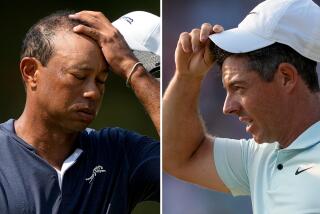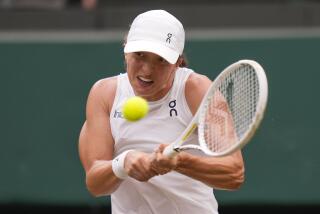Mac’s Last Attack? : McEnroe Reflects on a Stormy History at Wimbledon, Where the Tabloids Will Have to Pick on Someone Else
- Share via
LONDON — Behind the hallowed walls of ivy-covered brick at the All England Lawn Tennis and Croquet Club on Church Road in the village of Wimbledon, it’s impossible to hear Big Ben chime way over there on the other side of the Thames. But make no mistake, even though you can’t hear them, those bells are ringing like crazy, and for the first time in his life, John McEnroe knows they are tolling for him.
So what’s a living tennis legend supposed to do, now that he has made it public that he isn’t going to be around next year, banging balls into the shadows of Centre Court? Say he is sorry if he upsets anybody? Fling his racket into the Royal Box in one last, monumental tantrum? Retire to the gentlemen’s changing room ( not the locker room here), grab a pint, pop a videotape of his greatest hits into the VCR and gradually lose consciousness?
Actually, the only thing McEnroe is willing to guarantee won’t happen is the videotape bit. “You know, I just don’t find it interesting enough to sit and watch tapes about matches I’ve already played,” McEnroe said. “It bores me. I live in the present. OK, it hurts me in the sense that I feel like I don’t have as much enjoyment out of the game, like, ‘Why can’t you enjoy your last year?’ and ‘Why can’t you take it more lightly?’
“Well, I wish I could,” he said. “But at the same time, I know a certain part of what propelled me was my intensity and the style that I had, the way I was, so it’s impossible to totally change that. It’s like they always say with a marriage, if you get married to
someone, don’t expect them to change if you want a successful marriage.
“But I do wish at times, ‘God, John, why can’t you lighten up?’ I do have moments like that,” McEnroe said before he shook his head and stared straight ahead blankly. “There’s a lot of negativity flying around.”
Negativity, thy name is McEnroe, or at least that’s how you spell the name of the guy who has shown this absolute uncanny ability to attract such gobs of the stuff. For years, McEnroe has been both reviled and revered during tennis’ grandest spectacle, where the English sporting public grew to view McEnroe as Mac the Brat, the man they loved to hate.
McEnroe should have expected some of this attention. Like the time he wanted to practice at Queen’s Club and not so delicately told some female club members to leave the court, offering suggestions on how they might spend their free time. But how would McEnroe have known that one of the women he was hassling was the wife of All England Club Chairman R.E. (Buzzer) Haddington?
That small indiscretion earned McEnroe a lifetime ban from Queen’s Club, a punishment since rescinded, which means either that McEnroe’s natural life is already over or the British tennis hierarchy is in a forgive-and-forget mood with him. If so, it seems pretty sensible, since as sure as they are serving watercress and cucumber sandwiches at high tea, McEnroe and Wimbledon are forever linked. Like it or not, they are part of each other.
McEnroe is 33, far removed from his first trip to Wimbledon as an 18-year-old with magic in his racket and a shock of curly reddish-brown hair tucked under his headband. That was in 1977, when he reached the semifinals. By 1980, McEnroe was on his way to finishing the year with a No. 3 ranking when he stopped at Wimbledon and helped produce one of its greatest finals against 24-year-old Bjorn Borg, who had won four consecutive Wimbledon titles.
It was what you would call a study in contrasts--the fiery American against the silent Swede, the sting of a serve-and-volley aggressor against the cool efficiency of a ground-stroking baseliner. Borg, of course, was closing in on his fifth consecutive Wimbledon championship without having said as much as one word to Mrs. Haddington.
Borg ultimately defeated McEnroe, 1-6, 7-5, 6-3, 6-7, 8-6, in a final that most everyone in tennis remembers warmly. There is at least one exception, though.
“I lost that match,” McEnroe said. “I mean, I don’t look upon it too fondly. I was seeded second in 1979 (he lost during the fourth round to Tim Gullikson), so in 1980 it was like, hey, he’s got to start producing. So it actually put me in a different sort of league. Let’s say the respect that people had for me lifted.
“It was like in England, they love great losers. It lifted the aura that I had and then it was more like a matter of time (until a Wimbledon title). But I certainly didn’t feel that way. I was in a lot of pressure the next year (1981) to win because I really felt like I’d blown it the year before.”
McEnroe said he may have been lulled in 1980 after he won the first set, 6-1.
“I really felt like, OK, this is someone I should really beat easily on grass,” McEnroe said. “As it turned out, his competitiveness, I’d call it his ability--it was, like, slick --he would volley not on the strings, but it would work on grass. He just did enough to sort of make it so that the mental aspect of the game came in more and that’s where he succeeded in 1980.
“I was, like, so overconfident that I let up. And then all of a sudden, he sort of dug his way into it somehow and the next thing I know I’m down, two sets to one and 5-3, and then somehow save a few match points and win this great tiebreaker.
“I’d say that over the past 10 years, if people come up to me and say they saw me play one match, I’d say 90% of those people say they saw that match in the 1980 Wimbledon.”
And what do the other 10% remember?
“Probably the one I lost to Ivan Lendl in the ’84 French,” McEnroe said.
In that one, McEnroe won the first two sets, then lost the next three, missing his best shot at winning the French Open.
McEnroe is typically blunt in explaining what happened: “I sort of got tired and choked.”
Even if there never will be a French Open title in McEnroe’s resume, he does have three Wimbledon championships, something that Lendl would probably give up something dear to have. Whereas McEnroe may find himself enjoying his last trip around the grounds at Wimbledon, Lendl is still haunting the place with his gaunt presence, hoping he can win a Wimbledon title before his time, too, is up.
McEnroe is philosophical about his role in the development of Lendl, who went on to win seven other Grand Slam titles after the 1984 French Open final:
“Now if you look back, the French Open sort of put him on the map. ‘OK, he’s not a total choke artist.’ ”
And right now, it’s also worth remembering that this is the place that put McEnroe on the map. McEnroe is playing his 14th, and quite possibly last, Wimbledon. He has certainly had enough time to form an impression of the place, hasn’t he?
“On grass, every rally is like one serve and one return, that’s it,” McEnroe said. “That’s too bad. I mean, you look at Wimbledon, aesthetically it’s so beautiful. Now, all of a sudden, it’s a serve, maybe a return and one volley at the most and that’s it. That’s boring.”
McEnroe has always done his best to liven up the proceedings. A couple of years ago, for instance, he complained loudly about being distracted by a ticking sound underneath the stands at Court 1 during a match against John Fitzgerald. The ticking was coming from a refrigerator used to keep the tennis balls cool. Naturally, there was a major controversy. Outrage, shock, and anger were all directed at the usual target, and the London tabloids had a field day putting McEnroe in the deep freeze.
McEnroe won the match, but Haddington was in the men’s locker room afterward and saw Fitzgerald on the trainer’s table. Haddington shook Fitzgerald’s hand warmly, congratulating him for maintaining proper demeanor in the midst of McEnroe’s tantrum. Lying on the other trainer’s table and listening with interest was McEnroe’s brother, Patrick.
According to witnesses, the look on Haddington’s face when he was told of the presence of McEnroe’s brother was priceless.
As for McEnroe the elder, he chooses not to make an issue of anything except the game of tennis itself. He is calling for a new order to make the sport more interesting, which qualifies him as either a great visionary or an out-and-out anarchist. The next thing you know, he will probably want to put microphones on all the players.
“I’ve always been amazed at the people who say I get the calls,” McEnroe said. “If you tell a guy to screw himself in not so kind a way, you think you’re going to get a call the next time around? Let’s face it, we’re in 1992, but tennis in America is still considered an upper-class, yuppie-type of sport where not so long ago people were wearing long pants.
“People can’t take the idea of having mikes on the court. . . . Tennis doesn’t have enough of a base that it can survive without having to resort to getting a two-second sound bite of me questioning a call or yelling. It’s boring otherwise. That’s the unfortunate reality. That is the bottom line.
“And as for my place in tennis, if you have people dwelling on the negative, they’re going to find something negative. If you have people who have a recognition of the overall picture, I’m not concerned about my place in tennis history. My record speaks for itself. Where I stood as far as Davis Cup, about not going to South Africa, my doubles record--I’ve got three things right there that there’s not one other top guy you can put in the same league as me.
“Now, the results, OK, I haven’t won as many tournaments as Connors in singles, I haven’t won as many as Lendl, but I still will put my record up against anybody’s. So it comes down to how much they want to look at the times I told an umpire to screw himself.
“There’s one other thing people probably will remember, too.”
And what would that be? The 77 titles? The seven Grand Slam singles crowns? The four consecutive years ranked No. 1? An 82-3 record in singles in 1984? Three Davis Cup titles?
“At least you can say I was never boring.”
At Wimbledon, especially at Wimbledon, they will certainly remember that part.
More to Read
Go beyond the scoreboard
Get the latest on L.A.'s teams in the daily Sports Report newsletter.
You may occasionally receive promotional content from the Los Angeles Times.










